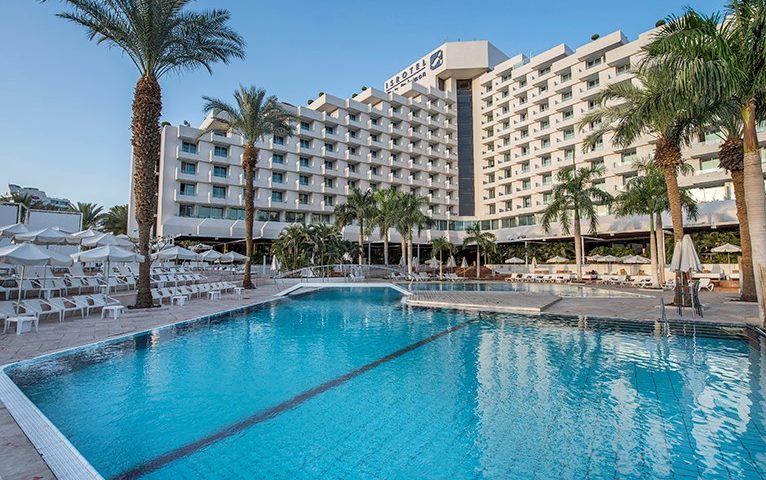Regaining public confidence is a major challenge for an industry seeking to recover from the pandemic.
JERUSALEM – FREE HAND sanitizer and disinfectant wipes, branded with the Brown Hotels logo, are among the new perks for guests staying at one of this boutique brand’s Israeli locations as they reopen following nearly three months of closure due to the coronavirus pandemic.
“Brown Hotels are ready for a corona routine,” declares a website detailing the cleaning routine at the chain’s properties, which include hotels in Jerusalem, Tel Aviv, Greece and Croatia.
As Israel is among the first wave of countries reopening hotels, properties are advertising their cleaning routines along with lower prices to appeal to a domestic market, as foreigners are still banned from entering the country. Reservations are slowly trickling in, but the sector faces major challenges, including gaining the public’s confidence, higher operating costs and a loss of the foreign market, which accounted for about half of all hotel stays in 2019, according to Israel’s Central Bureau of Statistics.
“We need to incentivize people to come,” says Ronen Nissenbaum, CEO of Dan Hotels, an Israeli company that plans to open two of its 18 hotels on May 27, then more throughout the summer, depending on demand. Prices are about 20% less than usual for the season, he says. So far, one of the Dan hotels is fully booked for its first weekend of operation, while the other property stands at about 60% booked, Nissenbaum says. Most reservations were made only in the past few days, when it became clear that beaches and pools would also be allowed to open at the end of May, although with regulations requiring 2 meters (6 ½ feet) between swimmers and sunbathers.
“It seems like there is pent-up demand for people to get out of their homes, but this may only be a burst, we will have to see if it continues,” he says.
While they are relieved to be back in business, hotel operators still face challenges, saying that complying with new health, cleaning and social distancing regulations is also driving up their costs. Current regulations require maintaining 2 meters between people, for everyone to wear masks and ban gatherings of more than 50 people. All this makes it more expensive and tedious to run operations such as dining rooms and requires extra vigilance to make sure public areas don’t become too crowded.
“Our profits will likely be close to zero this year,” Nissenbaum says.
[ MORE: How Wastewater May Help Track the Coronavirus ]
Many Israelis also say they are not ready to return to hotels, which were among the top places for the spread of the virus before the country’s tourism sector and economy closed in early March. The country, with a population of nearly 9 million, has by May 27 recorded only 281 deaths from the virus, a total of 16,771 cases and less than 20 new cases a day in the two weeks since it began opening schools and business. Half of the country’s population believes a second wave of COVID-19 is only a matter of time, according to a survey from the Israel Democracy Institute, a Jerusalem-based independent research center.
So when planning a trip to the Sea of Galilee area this summer, Tel Aviv resident Deena Hikri is headed for a villa with its own entrance, rather than an ordinary hotel room. “I don’t want to share elevators, and I want to minimize exposure to places with lots of traffic, like lobbies,” she says.
To assuage such fears, some hotels have changed check-in procedures, with the Brown Hotels offering freshly sanitized iPads so guests don’t need to touch pens or paper. The Dan chain has developed an app for check-in.
But questions also remain about how such procedures will change the atmosphere of hotels, making them less personal. At the Efendi Hotel, a 12-room boutique hotel in a restored Ottoman palace complex in the northern Israeli city of Akko, manager Dafna Starkmann worries about not being able to sit for tea with her guests when they arrive, or give them a tour of the building, due to social-distancing requirements.
“We will do our best, but it will be more difficult to make people feel like they have a personal connection,” Starkmann says. “It’s sort of sad.”
For those less concerned about exposure to the virus, they wonder if it is worthwhile to spend a large amount of money when they may have to wait their turn for the pool, and when some activities and facilities such as spas remain closed. Tel Aviv and Jerusalem are among the top 20 most expensive cities in the world for hotel rooms.
Yael Horovitz, a mother of three from the central Israeli city of Modiin, who works in high-tech sales, says she would love a weekend away with her husband at a hotel, but if access to facilities is limited and local attractions are closed or only open at partial capacity, “then it will just feel like we are paying a ton of money for a boring room.”

